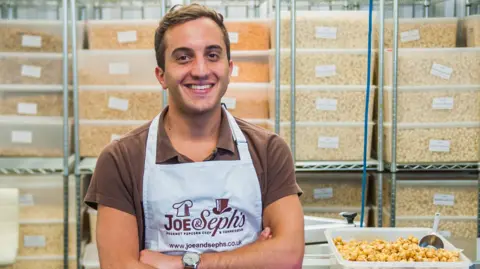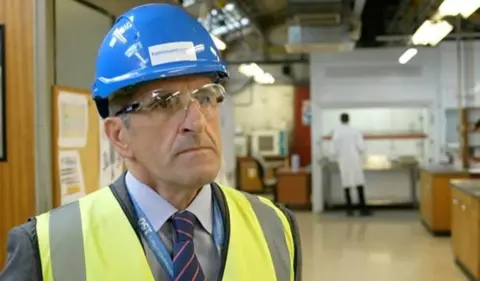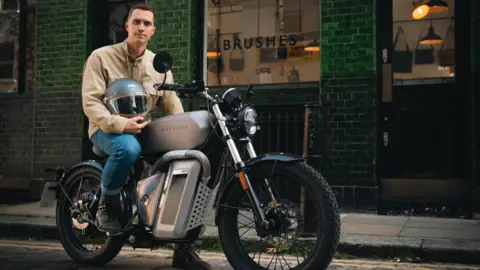The British winners and losers from Trump tariffs
 Joe & Seph's
Joe & Seph'sThe UK exported nearly £60bn worth of goods to the US last year, making it one of the most important markets for thousands of British businesses.
After President Donald Trump announced a 10% tariff on nearly all UK products, we spoke to businesses from some of Britain's biggest exporters to find out what it could mean for them.
Food and drink: 'We've got fewer orders than normal'
The UK food and drink industry exports a couple of billion pounds worth of goods to the US every year, satisfying Americans's taste for specialist products like smoked salmon, Scotch whisky and artisan cheeses.
Adam Sopher, co-founder and chief executive at Joe & Seph's, the London-based luxury popcorn-maker, says the mere spectre of tariffs had already been affecting the business.
US retailers usually place their orders for Christmas early in the year, but it's had far fewer orders than normal as retailers wait to see what happens.
Joe & Seph's made £8m in sales last year of which 2%-3% came from the US. "So it is not huge," says Mr Sopher. "But the US is the biggest popcorn market in the world so we had planned that a lot of our growth would come from there."
As a consequence, he says, it's now planning to focus on growing its exports to the Middle East and Asia.
However, the 10% tariff was not as bad as he was expecting and US importers aready have to pay a 5.8% tariff on Joe & Seph's goods when they reach American ports.
"So essentially what's happened is we're going to go from 5.8% to 10% as opposed to zero to 10%," says Mr Sopher. It is also lower than the new US tariffs levied on other countries, such as the 20% tax on the European Union.
"Ironically it could be a good thing," he says. "These retailers who would have sourced from Europe might now say 'actually we'll buy more from the UK."
Chemicals: 'We're hoping there is an opportunity'

For something not visible to the naked eye, organic chemicals are a huge US export for the UK, totalling close to £3bn last year.
They are used across a massive range of industries from food to make-up to engines and into agriculture.
Rather than feeling fearful about the US tariff, Robinsons Brothers reckons it may help the West Bromwich-based organic chemicals firm wrestle back American customers from cheaper overseas rivals.
Chief executive Adrian Hanrahan says: "We supplied a lot more to the US but China and India knocked us out of that because of very low pricing."
Under Trump's new regime, China's imports face a 34% tariff while India's products will be taxed at 27%. Robinsons Brothers chemicals are already taxed at 6% when they reach the US
Mr Hanrahan says he is still trying to nail down whether the new 10% US tariff on UK goods means Robinsons Brothers' American customers will be paying an additional 4% or a total 16%.
"Either way, it is a lot less than China or India will see going into the US," he says. "So I am really hoping and seeing an opportunity for us here in one area."
He says that since January, the company has been receiving more enquiries from the US, including two customers Robinsons Brothers lost five years ago "at great expense".
At the moment, Robinsons Brothers derives between 1.5% and 2% of total sales - which reached £24m last year - from America.
This "doesn't seem a lot" says Mr Hanrahan but they are high margin products.
There are, of course, concerns that rival countries may have to dump products once destined for the US on other markets, such as the UK which, in turn, could drive down domestic prices.
Mr Hanrahan says: "I am hoping that the UK government is preparing for that and putting something in place to mitigate any form of product dumping in the UK and in the EU."
- Live updates: Markets and reaction to Trump tariffs
- Full list: See all Trump tariffs by country
- Watch: Why Trump's tariffs aren't really reciprocal
- Explainer: What are tariffs, and why is Trump using them?
Aircraft: 'It's as clear as mud'
 Sebastian Down
Sebastian DownUK exports to the US linked to aircraft totalled £2.2bn in 2024, official figures show.
DPS Designs contributes a small - but important part - to that industry. The Forest of Dean-based firm makes metal moulds that are used to create plastic sections of airplane seats.
The US is DPS's biggest growth market. Around £150,000 worth of sales come directly from the US out of a total £3m.
The company's managing director of engineering, Sebastian Down, says the firm will negotiate with its customers "to see if we can share in the pain" of the new 10% tariffs - once he deciphers what they apply to.
"The amount of detail is paper-thin," he said.
DPS Designs has already had to grapple with the ambiguous language used by the White House around tariffs, after Trump announced 25% trade tariffs on steel and aluminium imports to the US. The company uses aluminium to make its moulds.
"There was no-one you could speak to so it relied on me going onto the US department of whatever website, trying to look at lots of detail that basically didn't exist," he says.
Ultimately, the aluminium tariff does not apply to his business. But the new 10% tariff criteria isn't clear either. Does it, for example, apply to parts that make up a product or only to the finished article itself?
"It is as clear as mud," says Mr Down.
Vehicles: 'We may have to raise prices'
 Maeving
MaevingThe US market for British-made cars is of enormous consequence for the UK economy. Last year, the UK exported £9bn worth to America.
The sector was already reeling from Trump's previously announced 25% US tariff on cars and light vehicles.
Mike Hawes, chief executive of the Society of Motor Manufacturers & Traders, says: "These tariff costs cannot be absorbed by manufacturers, thus hitting US consumers who may face additional costs and a reduced choice of iconic British brands."
With Trump's announcement on Wednesday of 10% US taxes on nearly all UK imports, the net will now widen to include the likes of electric motorcycle-maker Maeving.
Seb Inglis-Jones, co-founder and co-chief executive of the Coventry company, says that sales from the US are "ever evolving". Last month, for example, 68% of sales came from America though typically, the US makes up about 40% of its £6m annual turnover.
Mr Inglis-Jones says that the US has helped counterbalance a less-than-optimistic economic outlook in Maeving's other key markets such as the UK, France and Germany.
"In the US, there's just more disposable income and so with a slightly more discretionary purchase like ours, a slightly more expensive British built electric motorcycle, Americans are just way more able to spend that money."
He says that Maeving recently raised prices in the US, not as a pre-emptive move before tariffs but because the cost of doing business in the States had increased.
Will the company now lift prices again?
"We haven't got that far," says Mr Inglis-Jones. "I think we care more about, as a young EV [electric vehicle] company, about the growth and making sure the price is right for the US customer.
"If we can't stomach it, we will have to put the prices up again."
